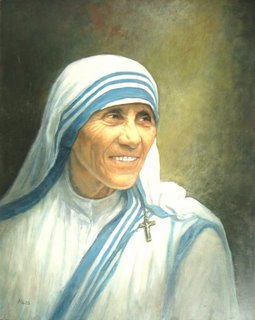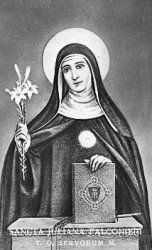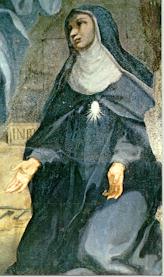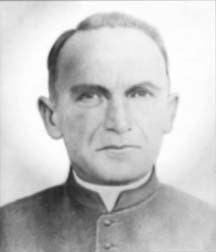
Agnes Bojaxhiu, was born in the city of Skopje no one could have known then that a truly remarkable woman was born to this century, a woman who would lead the way in the revolution of love in a world grown weary of it. This is a world which has become gluttonous for the impure, the immodest and the immoral, where the Sacred has given way to the 'gods' of prosperity and power in a consumer age.
None could have predicted the enormous impact this one woman had on the world, where Presidents would tremble at her words, where Queens would honour her with titles and awards and a nation which would grant her the title of Peacemaker, in a world torn apart by war. Mother Teresa herself took no note of the titles, benefits or other worldly accruements which came her way, she instead embraced the lowly, the impoverished and the diseased, not only did she embrace them, she lived with them as one of them, for to Mother Teresa they were the face of Christ in the poorest of disguises. Where many would spit upon the face of the diseased, Mother Teresa kissed them, where others threw money at the beggars to appease their conscience, Mother Teresa became a beggar, for there is no shame in being born poor, the shame lay with the hoarders of wealth. To the abandoned, Mother Teresa was their refuge, to the forgotten, Mother Theresa remembered them, to the diseased ravaged Mother Theresa was their step to dignity. To the wealthy Mother Teresa was their bane, to the powerful Mother Teresa was their conscience, to the despots Mother Teresa was to be feared. Though to the poor Mother Teresa was their face of....love. Many would try to emulate her, but there will only ever be one Mother Teresa, but what drove this remarkable woman? Where did her strength come from?
Before she took the name of Mother Teresa, she was first known as Sister Mary Teresa, after her favourite Saint, Terese of Lisieux and lived among the Religious community of the Sisters of Loreto. Here she lived for many happy years as she taught the children of the more wealthy and prominent families in India at St. Mary’s School for girls. This was a happy time for Sister Teresa a time of fulfilling God's Will by teaching the children of the future and Sister Teresa adored the girls and the community in which she lived, she showed no inclination to leave as she embraced her life and lived it with real joy and exuberance. This part of her life must not be underestimated for it is true that Sister Teresa felt complete as she taught the girls whom she had come to love and was loved in return by them. What then drove Sister Teresa to leave the community that she loved with every fibre of her being? How could she leave those in whom she had embraced for what and to where? Dare she give up the security of what she had known and walk out to the unknown?
One can only imagine the inner turmoil that Sister Teresa felt when upon leaving on a spiritual retreat, this remarkable Sister felt 'the call within a call', and then in absolute obedience she acted upon Jesus calling her to be with Him in the service of the poorest of the poor. But this action like many more cost Sister Teresa, and she mourned deeply for the life she was to leave behind, she would miss her beloved students, her fellow Religious Sisters and Priests...the pain of loss was real and deep.
So upon gaining her Superiors permission Sister Teresa left her beloved convent, where her future had been secure into the maelstrom of noise, smells, filth, tears, rage and violence which was the streets of Calcutta. All Sister Teresa had was the 'Divine inspirations' from her beloved Spouse Jesus to "Come be My light," but though Teresa took these words seriously, how could she, one woman alone succeed amidst such squalor? These thoughts tormented the young Sister Theresa as she tried to cope with such a change in her circumstances, where there was no longer a schedule of religious life to follow. How was she to begin such a massive order when all around her everyone was destitute and diseased, the thoughts swirled in her mind...how? How? How?
To these questions came....silence! How Teresa must have longed for the security she had left behind, where everything was clean and orderly. Here she was in an inhospitable landscape to serve the poor, who were diseased, smelly, ungrateful, unhappy, and suspicious of this woman who was dressed in a blue and white Sari, and called herself Mother Teresa. Just as Mother Teresa had her doubts so too did the people she had come to serve, who was this woman in the sari? What was her 'real' motive? Was this woman mad? Did she not realise that there were murderers in the streets who would think nothing of killing a 'Religious' for they had no respect for anyone. Then finally many thought, this religious wont last long she will go back to her comforts as they looked upon her with disdain mixed with...hope? Just like Mother Teresa many thought what can one woman do?
The driving force that drove Mother Teresa was her love of God and the sufferings of Christ which she recognised in the poorest of the poor, but Mother Teresa was a teacher, she was not a nursing Religious. So in all practicalities Mother Teresa took a course on nursing, after which she returned to the streets of Calcutta, more resolute in heart, more steady in her mission and more in love than ever with her Lord and Saviour. But was her love returned? For in the heart of this devout nun lay such a barren landscape of no consolation that it tore at her heart ripping it to shreds as she endured the 'dark night of the soul'. Though Mother Teresa spent many hours in prayer, it felt as if her prayers were going into the air unheard and unloved, her every effort unappreciated by the one she so loved with all her heart and soul…why? Why such silence?
What Mother Teresa was experiencing was an aridity of soul that only a few Saints have passed through, let us not gloss over the enormity of the desolation that Mother Teresa felt within her soul as she worked and gave assistance to the poor and desolate. For the love that Mother Teresa gave to those who needed it, she herself felt her love was not returned, through the long nights of despair where her soul was deluged with doubts...not one word from her Divine Spouse....total and gut wrenching...silence.
Mother Teresa worked from sun rise to long into the night as she helped those around her, there were no clinical conditions as found in western countries. Here Mother Teresa picked up the elderly who had been abandoned in garbage dumps, and would sit and pick out the maggots that had infested the skin, the skin of those unwashed and unloved. She held dying babies in her arms who never had the chance to learn to smile, they too were abandoned to their fate, unloved and unwanted. Everywhere Mother Teresa looked was the ugliness of life at its most desperate and at the end of a long and arduous day where she had kissed and prayed for the dying, comforted the sick who would not last the night and held the children who did not recognise what it is to be cuddled. Mother Teresa turned to prayer to find no solace as her mind took in the sights and the affliction of all around her. How could this woman continue?
What kept Mother Teresa going was her love for God, for she loved God not for what He could give her, but how she could serve Him. Mother Teresa lived out the true meaning of love in all its rawness, for love is not about gaining but in giving. True love is to empty oneself for the love of others and not count the cost, it is to give when the well is dry, it is to share while your own soul feels it's own bareness. It is to give the very essence of yourself without holding back, it is to love with a passion that defies all logic, it is to love unto madness.
Mother Teresa was mad, yes! Mad with love for God, for who He is, despite her lack of 'feelings' Mother Teresa knew God, she saw her wounded Love in the face of the impoverished, in the eyes of the dying, in the unheard screams of the unborn, she saw her Beloved in everyone.
While her own spirit was undergoing its annihilation, she continued to love the unloved, irrespective of her own agonies, her own pain and her own loneliness. She would become the voice of the voiceless, the empowerment of the powerless, the conscience of the immoral and the indictment of the pro choice movement! Where others turned away, Mother Teresa embraced the ugliness that is life for many, where others compromised the truth, Mother Teresa stood firm, where some conditioned their love, Mother Teresa gave her love without need of a receipt. This woman of God would not turn away from the weak and the weary, the sorrowful and the diseased, the people who make us all uncomfortable, Mother Teresa was not a bystander of life, but instead leapt into life with all its ugliness, rawness and humiliations. For at the core of Mother Teresa's life was the words uttered by Christ Crucified.....'I THIRST'.
It is in Mother Teresa we see what we are all capable of and fail to do, one can no longer say, they cannot help the whole world....Mother Teresa showed us how. We can no longer hide our lack of caring, Mother Teresa showed us how to care. We can no longer stay silent on issues integral to our Faith where the unborn are murdered daily, where prisoners are executed in civilized countries...where children die of hunger and thirst as we water our gardens and throw away our left overs. Mother Teresa spoke up, she stood firm, she condemned the slaughter of the innocents, spoke out against the death sentence and she fed and gave water to the hungry and the thirsty.
Presidents listened to her, Princesses tried to emulate her, Queen's honoured her and the poor loved her. In Mother Teresa we see the Power of Love which had no limits...as eternity echoes with the words...."I Thirst"...
Mother Teresa died in 1997.
Blessed Mother Teresa was beatified in 2003 by Pope John Paul II.
Some Quotes
"Being unwanted, unloved, uncared for, forgotten by everybody, I think that is a much greater hunger, a much greater poverty than the person who has nothing to eat."
"Do not think that love, in order to be genuine, has to be extraordinary. What we need is to love without getting tired."
"Do not wait for leaders; do it alone, person to person."
"Everybody today seems to be in such a terrible rush, anxious for greater developments and greater riches and so on, so that children have very little time for their parents. Parents have very little time for each other, and in the home begins the disruption of peace of the world."
"Everytime you smile at someone, it is an action of love, a gift to that person, a beautiful thing."
"I have found the paradox, that if you love until it hurts, there can be no more hurt, only more love."
"If you can't feed a hundred people, then feed just one."
Peace of Christ to you ALL
Copyright © 2006 Marie Smith. All rights reserved.




